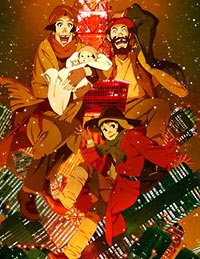REVIEW: Tokyo Godfathers
A drunk, a drag queen and a runaway kid... what is this, a joke? A Review of Tokyo Godfathers.
 Satoshi Kon has a reputation so far of doing some pretty heavy films that seem to end on a tragic note. Perfect BlueEwhich while good is disturbing to watch, and Millennium ActressEwhich ends bittersweet, are films that you don't watch to cheer yourself up. However, Mr Kon actually takes a serious subject yet again but instead of angst, it has a huge amount of hope.
Satoshi Kon has a reputation so far of doing some pretty heavy films that seem to end on a tragic note. Perfect BlueEwhich while good is disturbing to watch, and Millennium ActressEwhich ends bittersweet, are films that you don't watch to cheer yourself up. However, Mr Kon actually takes a serious subject yet again but instead of angst, it has a huge amount of hope.
Tokyo Godfathers is about three homeless people who find an abandoned child in a trash heap. Not quite a cheerful setup to begin with, but it's the characters involve that keep the story mixed with enough comedy not to sink it. Gin is an alcoholic grouch who has pretty much given up hope on his life getting any better. Hana is an outrageous drag queen who personifies the word "diva" from the get go. Miyuki is a sour acting runaway who is just as argumentative as the other two. However, once the baby is discovered, the static patterns of their drifting lives start to change. As each reason they have chosen their fate is revealed, by that act alone seems to bring them out of their hopelessness just a little bit, and on their way to having salvation put in their reach. But the road is one they will each have to travel on by their own will, but not alone.
What was wonderful about the story was the sheer audacity of the work itself. This could have easily gone into becoming a public service announcement, a bad comedy routine or completely implausible. The first part was that Mr Kon does not wince from the realities of life on the street, but did not linger on them either. Things such as waiting in line at a soup kitchen are put into an appropriate context and are not dwindled on any longer than what it takes to forward the story. The second part is everyone in the story is an outsider in one way or another; from the mob boss met during the film to the Spanish immigrants in the slums of Japan. Everyone has been put in a place by fate, but as the story goes on the message given is what you make of it that creates your reality. This is mostly stressed in the actions of Hana, the drag queen, who by far is the most enjoyable character and the one with the largest heart. Though her actions she leads the other two on to find the baby Kiyoko's mother, hopefully to spare her the fate that Hana finds herself in. The last thing is the blatant use of "it just so happens" used around Kiyoko. Things just happen to go their way when they center their attention around her, with almost unrealistic luck occurring in a way that if done in any other film would elicit groans from critics as sloppy writing. However, the effect of "it just so happens" is used as an expression of fate itself and of hope.
The subtitled version is a wonderful viewing, giving natural dialogue and interesting translation choices for some of the insults they sling at one another. The animation itself is what has become standard for a Satoshi Kon film, luscious visuals that flow freely, and the mix of aesthetics that could make even steam rising over a decrepit building look beautiful. Also, the rubber quality of the characters expression makes the humor accessible, and allows us to see the humor in the situation when called for. The effect is not to flinch at what is being shown, to watch and anticipate every step even when the events turn tragic or painstakingly raw.
This is another fine example of anime that will rise to the ranks of a classic and show just what can be done with the medium. With brutal honestly given a poets touch, Tokyo Godfathers is willing to brave a dark world and show what the power of hope can bring if you actually choose to accept it.
|
0
|

|
|
0
|

|
|
|
EarthsMightiestAdmin
3/2/2004
Akadot